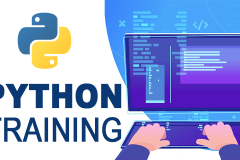Here is a Basic Python Programming course syllabus that covers the fundamentals of the language:
-
Introduction to Python - This section covers the basics of the Python programming language, including data types, variables, operators, and control structures.
-
Basic Data Types - In this section, you will learn about the different basic data types in Python, such as integers, floating-point numbers, strings, and booleans. You will also learn how to perform basic operations on these data types.
-
Control Structures - This section covers the different control structures in Python, such as if statements, for loops, and while loops. You will learn how to use these structures to control the flow of your program.
-
Functions - This section covers the basics of functions in Python, including how to define and call functions, and how to pass arguments to them. You will also learn about recursive functions and lambda functions.
-
Modules and Packages - In this section, you will learn about the different modules and packages in Python, and how to import and use them in your programs.
-
Input and Output - This section covers how to read from and write to files in Python, as well as how to handle standard input and output.
-
Exception Handling - This section covers how to handle exceptions in Python, including how to try and except blocks and how to raise exceptions.
-
Object-Oriented Programming - This section covers the basics of object-oriented programming in Python, including classes, objects, inheritance, and polymorphism.
-
Regular Expressions - In this section, you will learn about regular expressions in Python, and how to use them to search and manipulate strings.
-
Advanced Topics - This section covers advanced topics in Python, such as generators, iterators, and decorators.
This syllabus is intended to provide a general overview of the topics that will be covered in a course.







